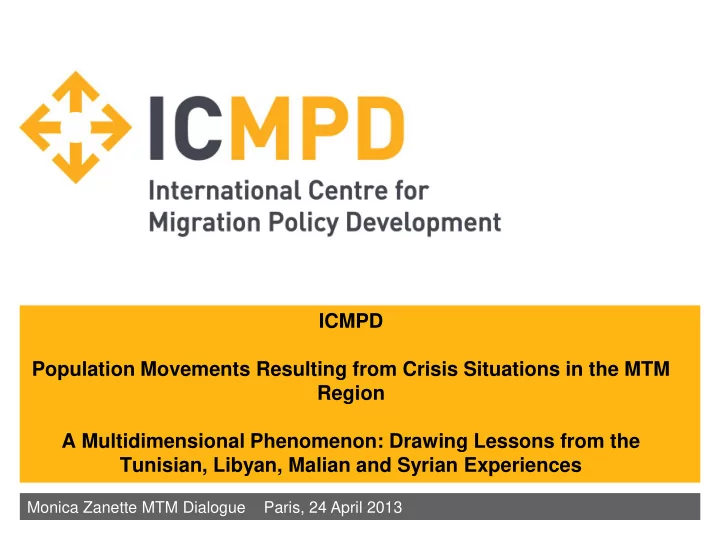

ICMPD Population Movements Resulting from Crisis Situations in the MTM Region A Multidimensional Phenomenon: Drawing Lessons from the Tunisian, Libyan, Malian and Syrian Experiences Monica Zanette MTM Dialogue Paris, 24 April 2013
The MTM i-Map Expert Meeting: Population Movements in the MTM Region resulting from Crisis Situations: Experiences, Responses and Challenges ahead The objective of the meeting is to address various aspects of population movements in the MTM region resulting from crisis situations Picture: Libyan refugees arriving in Tunisia, 2011, Getty Images Picture: Malian refugees in Burkina Faso's Goudebou refugee camp, 2013 Monica Zanette Southern Dimension Paris, 24.04.2014 1
Take stock of this phenomenon and the responses provided by national and international actors from a preparedness and emergency perspective in the light of four case studies taken from MTM Partner States namely the Tunisian , Libyan , Malian and the Syrian crisis. Definition of a crisis and the qualification of such phenomenon is difficult ( Criteria not defined) . Multidimensional character of population movements originating from emergency situations which require a wide range of responses from all involved actors. Monica Zanette Southern Dimension Paris, 24.04.2014 2
Crisis-population movement nexus population movements Crisis (both internally and internationally) (regardless of their causes ) can generate which can be rooted in conflict or other factors such as natural disasters or man-made catastrophes Monica Zanette Southern Dimension Paris, 24.04.2014 3
Lessons learnt: strong pressure on the region and beyond Crises can trigger large scale movements of people crossing the borders into neighbouring countries but can also induce secondary movements These situations tend to generate considerable regional population movements, creating high pressure on neighbouring countries The support of neighbouring states which decide to host affected people needs to be well acknowledged as well as their humanitarian effort and solidarity Monica Zanette Southern Dimension Paris, 24.04.2014 4
Overview of responses: emergency phase Access to the territory: open-door policy Status in host countries: countries opened opted for a wide range of different responses in line with their legal framework and adapted to their capacities Reception: some countries decided to set up refugee camps whereas others opted for accommodation among local communities IOs provided support to affected countries for instance through: RSD process, management of refugee camps and support to urban refugees The EU and EU MS: Border surveillance through Frontex and provision of humanitarian and other assistance to population in affected countries. Monica Zanette Southern Dimension Paris, 24.04.2014 5
Lessons Learnt: enhancing preparedness A comprehensive legislative and policy framework (particularly on asylum and Participants highlighted the need for: international protection ) Early warning systems which aim at monitoring potential situations or crisis likely to generate population movements and allow planning the funding for logistics and human resources Contingency planning which explore all kinds of emergency scenarios and usually include clarification of responsibilities, identification of capacities and resources needs, and coordination between local, national and international actors Monica Zanette Southern Dimension Paris, 24.04.2014 6
Lessons Learnt: Responding to crisis situations in the short term Crises scenarios may affect nationals as well as third Participants also country nationals at the same time, which requires emphasised the different and targeted responses to address importance of : people’s individual needs . Anticipating a crisis and better planning Quick mobilisation of financial, human, and material resources . The need for efficient cooperation mechanisms between As an immediate response, ad hoc support to people different agencies fleeing irrespective of their background is necessary. Once the immediate support has been provided the responses may differentiate due to the people concerned. Monica Zanette Southern Dimension Paris, 24.04.2014 7
Lessons learnt: responding to crisis situations in the long term Participants shared experiences with regards to: Elaborating Strengthening Granting Establishing efficient comprehensive humanitarian permanent coordination relocation, assistance residence / mechanisms resettlement and humanitarian between national and return plans permits local authorities Monica Zanette Southern Dimension Paris, 24.04.2014 8
Lessons learnt: long term response Resettlement programmes: limited opportunities but other options are being explored such as visas or humanitarian admission permits . Some EU MS have granted international protection, permanent residence permits, tolerated stay or long stay visas. Processes of applications in some EUMS embassies in Syria’s neighbouring countries have also taken place. Repatriation : requires stabilisation in the country of origin Local integration : not an option in most countries, mainly due to the lack of legal framework related to international protection Monica Zanette Southern Dimension Paris, 24.04.2014 9
Lessons learnt: risks Paramount consideration which emerged unanimously: Finding a balanced approach to population movements resulting from crisis situations between: the human security dimension the national security paradigm & The risk of involvement of transnational organized crime groups is very high in crisis situations improve police cooperation along the interested routes (including enchnaced cooperation among Immigration Liaison Officers) Monica Zanette Southern Dimension Paris, 24.04.2014 10
Lessons Learnt: The need for a concerted approach International support is needed as well as Support from further away countries sharing responsibilities between (EU countries) so far mainly consisted Northern and Southern countries. of resettlement, humanitarian admission programmes, and visa facilitation for family reunification Considering that local communities as well as provision of financial are highly affected , it is essential to contributions to neighbouring integrate them in the development of countries. coordination strategies between national and international actors. The responses require an advanced level of coordination between national, international and local actors. Monica Zanette Southern Dimension Paris, 24.04.2014 11
Ways forward Focusing on addressing root causes of these population movements resulting from crises situations, for instance, through a comprehensive development approach and better mobility opportunities or political dialogue should be explored Monica Zanette Southern Dimension Paris, 24.04.2014 12
Thank you very much for your attention!
Monica Zanette Programme Manager Gonzagagasse 1, 5th floor 1010 Vienna Phone: +43 1 504 4677 0 Austria Fax: +43 1 504 4677 2375 www.icmpd.org E-mail: monica.zanette@icmpd.org
Recommend
More recommend